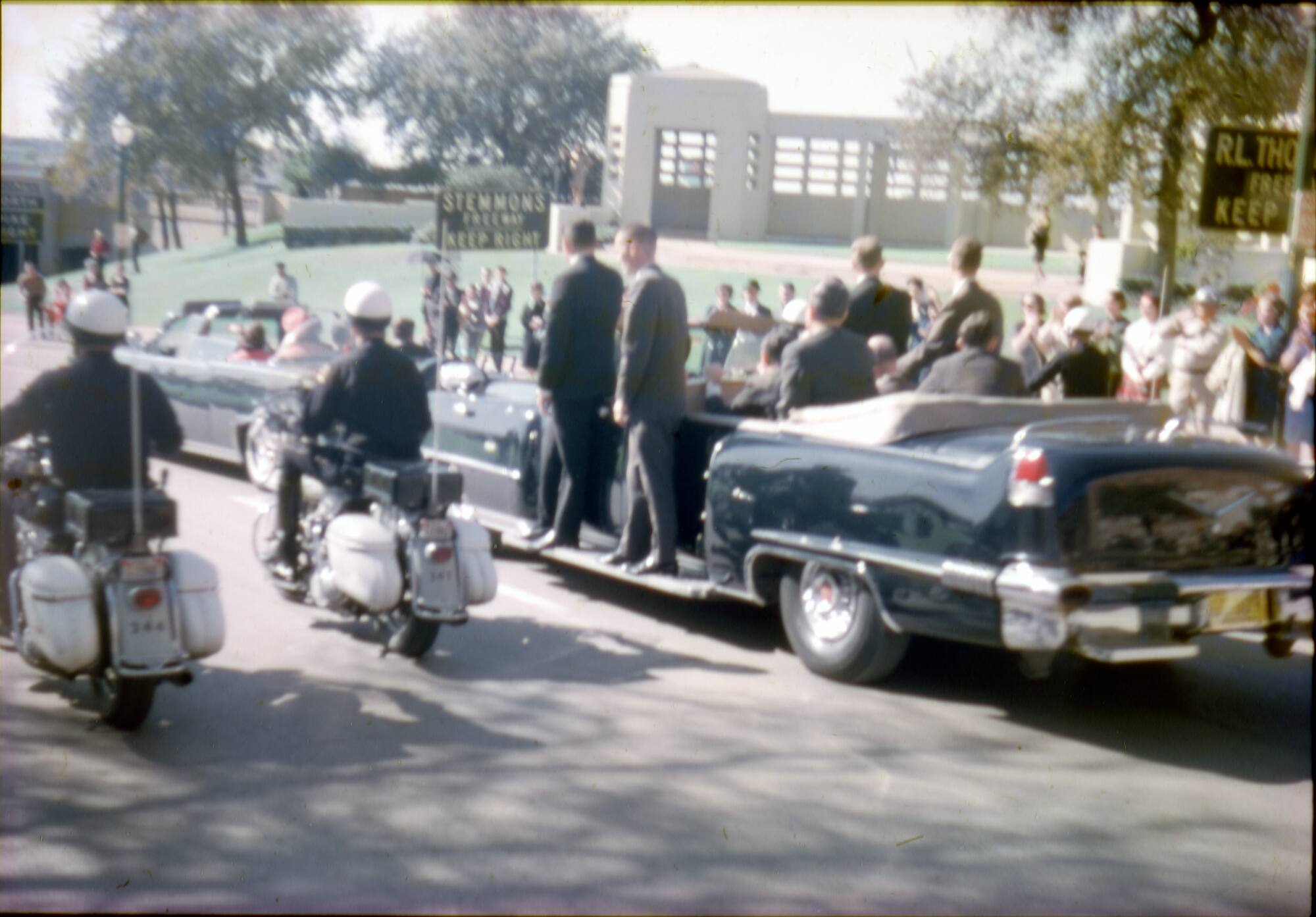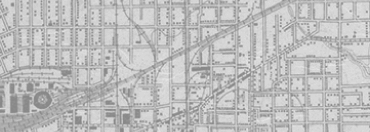


Back
Phil Willis Slide #7 (Willis 5)
Original 35mm color slide taken by assassination witness Phil Willis showing the presidential limousine and the Secret Service follow vehicle from behind, traveling west on Elm Street through Dealey Plaza. Commonly known as "Willis 5" by assassination researchers, the slide corresponds to Zapruder frame 202 just prior to the first shot.
Phil Willis Slide #7 (Willis 5)
11/22/1963
Film
2 x 2 in. (5.1 x 5.1 cm)
Phil Willis Collection/The Sixth Floor Museum at Dealey Plaza
2002.040.0007
In addition to witnessing the assassination of President Kennedy, Phil Willis was also present at another historic event: the bombing of Pearl Harbor on December 7, 1941. A second lieutenant in the Army Air Corps, Willis was assigned to the 86th Observation Squadron at Bellows Field in Oahu, Hawaii, during the Japanese attack. During World War II, he flew a total of 52 combat missions. Mr. Willis passed away in January 1995, before he could record an oral history with the Museum. However, his wife, Marilyn Willis, participated in a videotaped group interview with other assassination eyewitnesses on November 22, 1996. - Stephen Fagin, Curator
Willis 5 is one of the most tantalizing and controversial pictures of the Kennedy assassination, and both it and the photographer’s recollections are found in many assassination-related books and articles. Phil Willis told the Warren Commission and anyone who asked for the rest of his life that he snapped the shutter as a result of being startled by the first shot. The apparent reactions and posture of some in the crowd certainly seem to support his memory, though official investigators tend to conclude that he was mistaken because the president was blocked from the assassin’s view at this moment by a tree (which is still standing, though is now much taller). The tree and the face of the Texas School Book Depository building can be seen reflected on the back trunk of the Secret Service car directly behind the Kennedy limousine. Abraham Zapruder and his receptionist, Marilyn Sitzman, can be seen atop a concrete pedestal to the right and beyond a Stemmons Freeway road sign. A dark shape behind a white wall to the left of the sign has been dubbed “Black Dog Man” because investigators thought it looked like a puppy perched on top of the wall. The object is actually a person who, to this day, remains unidentified. Slightly below and to the left of the sign is the “Umbrella Man,” who remained unidentified for 15 years until a coworker revealed he was Dallas resident Louie Steven Witt. Witt acknowledged his presence that day, explaining to investigators for the House Select Committee on Assassinations that he was heckling the president with his umbrella – an obscure reference to JFK’s father and British Prime Minister Neville Chamberlain. Some conspiracy researchers were unconvinced and wondered if the umbrella held a gun or poison dart used by a co-conspirator during the assassination. - Gary Mack, Curator
Phil Willis' entire family joined him in Dealey Plaza to see the president's motorcade: his wife, Marilyn, their daughters Linda and Rosemary, and Marilyn's parents, Mr. & Mrs. William H. Stubblefield. Neither Rosemary nor the Stubblefields were questioned by the Warren Commission, although the other members of the family were interviewed. - Gary Mack, Curator

Phil Willis Slide #7 (Willis 5)
Original 35mm color slide taken by assassination witness Phil Willis showing the presidential limousine and the Secret Service follow vehicle from behind, traveling west on Elm Street through Dealey Plaza. Commonly known as "Willis 5" by assassination researchers, the slide corresponds to Zapruder frame 202 just prior to the first shot.
Phil Willis Slide #7 (Willis 5)
11/22/1963
Dealey Plaza
Limousine
Police
Motorcycles
Eyewitnesses
Crowds
Motorcade
Photographs
Elm Street
Assassination
Willis, Phil
Kennedy, John F.
Secret Service
Dallas
Film
2 x 2 in. (5.1 x 5.1 cm)
Phil Willis Collection/The Sixth Floor Museum at Dealey Plaza
2002.040.0007
In addition to witnessing the assassination of President Kennedy, Phil Willis was also present at another historic event: the bombing of Pearl Harbor on December 7, 1941. A second lieutenant in the Army Air Corps, Willis was assigned to the 86th Observation Squadron at Bellows Field in Oahu, Hawaii, during the Japanese attack. During World War II, he flew a total of 52 combat missions. Mr. Willis passed away in January 1995, before he could record an oral history with the Museum. However, his wife, Marilyn Willis, participated in a videotaped group interview with other assassination eyewitnesses on November 22, 1996. - Stephen Fagin, Curator
Willis 5 is one of the most tantalizing and controversial pictures of the Kennedy assassination, and both it and the photographer’s recollections are found in many assassination-related books and articles. Phil Willis told the Warren Commission and anyone who asked for the rest of his life that he snapped the shutter as a result of being startled by the first shot. The apparent reactions and posture of some in the crowd certainly seem to support his memory, though official investigators tend to conclude that he was mistaken because the president was blocked from the assassin’s view at this moment by a tree (which is still standing, though is now much taller). The tree and the face of the Texas School Book Depository building can be seen reflected on the back trunk of the Secret Service car directly behind the Kennedy limousine. Abraham Zapruder and his receptionist, Marilyn Sitzman, can be seen atop a concrete pedestal to the right and beyond a Stemmons Freeway road sign. A dark shape behind a white wall to the left of the sign has been dubbed “Black Dog Man” because investigators thought it looked like a puppy perched on top of the wall. The object is actually a person who, to this day, remains unidentified. Slightly below and to the left of the sign is the “Umbrella Man,” who remained unidentified for 15 years until a coworker revealed he was Dallas resident Louie Steven Witt. Witt acknowledged his presence that day, explaining to investigators for the House Select Committee on Assassinations that he was heckling the president with his umbrella – an obscure reference to JFK’s father and British Prime Minister Neville Chamberlain. Some conspiracy researchers were unconvinced and wondered if the umbrella held a gun or poison dart used by a co-conspirator during the assassination. - Gary Mack, Curator
Phil Willis' entire family joined him in Dealey Plaza to see the president's motorcade: his wife, Marilyn, their daughters Linda and Rosemary, and Marilyn's parents, Mr. & Mrs. William H. Stubblefield. Neither Rosemary nor the Stubblefields were questioned by the Warren Commission, although the other members of the family were interviewed. - Gary Mack, Curator









